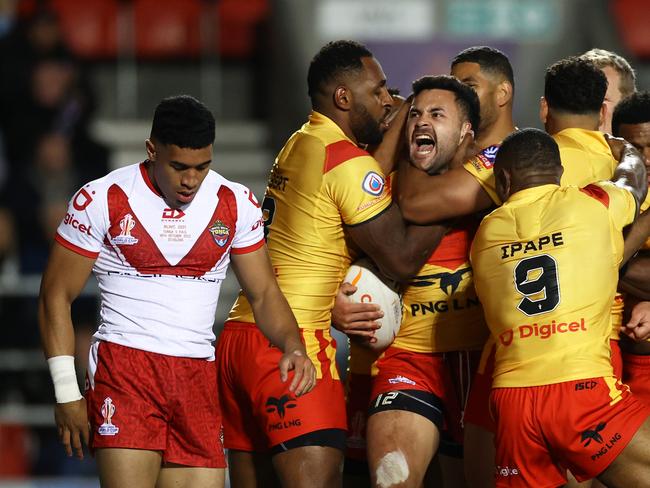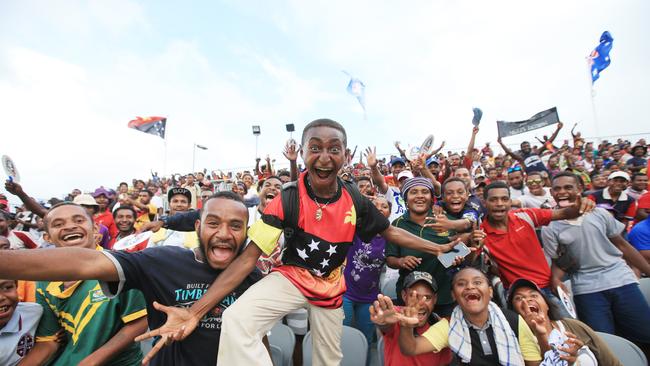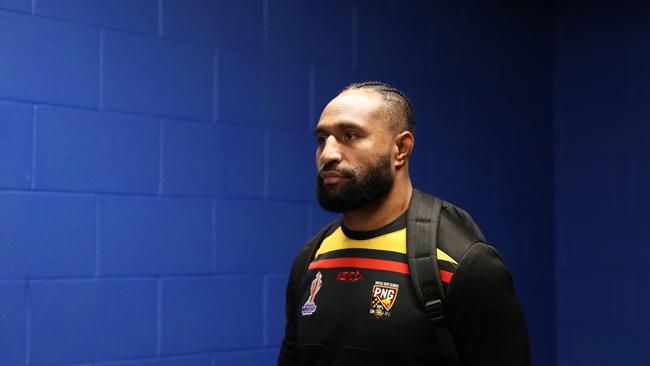NRL Expansion: PNG team’s tax free status a huge recruiting tool
The government has signed off on a controversial tax arrangement which will give the PNG expansion team an unfair advantage when it comes to recruiting players. SEE THE DEAL

NRL
Don't miss out on the headlines from NRL. Followed categories will be added to My News.
The NRL is set to receive a tax-free government deal that will see Papua New Guinea admitted in 2028 and the code’s top stars pocket extra millions by playing in the Pacific.
The landmark development comes amid revelations the NRL could have 20 teams by 2030 under the ARL Commission’s expansion masterplan.
This masthead can reveal the PNG and Australian governments are in talks to broker a historic deal that will offer the NRL’s elite tax-free ‘danger money’ by moving to Port Moresby.
The NRL’s No. 1 player, Nathan Cleary, is currently on $1.3 million-a-season at Penrith.
Under a tax-exempt PNG contract, Cleary would theoretically save $581,628 on the tax he currently pays every year in Australia.
It means a superstar player, such as Cleary or Broncos ace Reece Walsh, could pocket an extra $5.8 million over a 10-year period – all tax-free – by playing NRL in PNG.
That is the extraordinary financial sweetener beckoning for NRL stars who are prepared to back rugby league’s offshore expansion plan for PNG to become the code’s 19th team.
It can also be revealed:
* The Australian government has reached an in-principle agreement with the NRL on $600 million in funding for the proposed PNG team;
* The 10-year deal, which will see a PNG team specifically given $29 million annually for a decade, will be formally announced in August;
* The Perth Bears are slated to be the NRL’s 18th team in 2027 with PNG to follow 12 months later;
* The NRL could have 20 teams as early as 2030, which would provide an extra two games per week for the code’s next TV rights deal; and
* Billionaire Roosters chairman Nick Politis, who last year led a formal push for a 20-team NRL, called for the return of the Bears.

“It would be great to see North Sydney back again,” Politis said.
“I have been pushing for this because Perth and the Bears would be a great combination.
“It will be a Western Australian team, we must remember that, but the Bears can play an important part and revive their brand which would be fantastic.”
The NRL called for expressions of interest a fortnight ago, with ARL Commission boss Peter V’landys in the advanced stage of negotiations with Australian prime minister Anthony Albanese.
As an adjunct to their high-powered talks, the PNG and Australian governments have discussed tax benefits to underpin the ‘soft-diplomacy’ birth of the NRL’s 19th team in the Pacific.
The PNG cabinet has yet to approve the measure but it is expected to receive support from their government.
The tax-free incentive idea first surfaced in February, but talks ramped up during a meeting on the eve of State of Origin III in Queensland last Wednesday night.
There are fears a PNG team would be a public-relations disaster for the code – especially if Australian-based players baulked at living in a proposed NRL compound to be built in Port Moresby.
But major tax concessions from the PNG government are a massive financial carrot that represent a game-changer for the NRL’s expansion masterplan.
The PNG side will still operate under the NRL’s salary cap.
This year’s NRL payment ceiling for each club is a total gross amount of $12.3 million for a 30-man roster.
By offering tax-free deals, a PNG team would effectively be $5.7 million better off – per season – compared to Australian and New Zealand teams.

While rival clubs will consider the tax relief an unfair playing field, the NRL does not control tax regulations, with New Zealand already offering Warriors players a better tax-rate compared to Australia.
During Magic Round in May, V’landys said NRL stars would jump at the chance to earn tax-free dollars in PNG.
“A lot of my staff at NSW Racing get headhunted to go to Hong Kong and there’s only one reason – because they only pay 15 per cent tax over there,” he said.
“They are able to save up a fair bit of money.
“The players won’t live there forever, and they could earn double or three times what they would have earned if they lived in Australia.
“You want people to go to PNG with the necessary skills to be able to deliver what we want to deliver (an NRL team).”
NRL chief executive Andrew Abdo met club bosses on Tuesday where he gave them an update on expansion as part of the march towards 20 teams.
It is understood Abdo told the clubs that head office is putting together a business case on expansion and no decision would be made until it was completed.
The clubs have made clear in talks with the NRL that they expect to walk away from fresh expansion with significantly more money in their own pockets.
The Australian government’s funding package will duly reward the existing 17 clubs.
Of the $600m deal, $290 million will go to the PNG team over 10 years.
A further $250m will be allocated to pathway development and social-welfare programs in PNG, leaving between $50-60 million to be paid as a licence fee, which will be shared by the NRL clubs.
Up to 11 consortia have expressed interest in expansion, but the Perth Bears, PNG and a second New Zealand team are the frontrunners to complete a 20-team NRL.
There were plans for a 20th team in 2032, the year of the Brisbane Olympics, but three new NRL licences could be issued by 2030.
“We had 20 teams in 1995 before Super League, it can work,” Politis said.
“We need to become a national sport to compete with the AFL and if we want to do that, we need to plug the holes and become a truly national competition.
“It will help us with content and media deals.
“It’s very important we keep growing our revenue base and one way of doing it is to increase the content and we can only do that by expanding the game.
“With three more teams you have to spread out the time period.
“If the next two teams come in by 2027-28, then it makes sense having 20 teams in 2030 for the next broadcast deal.”




